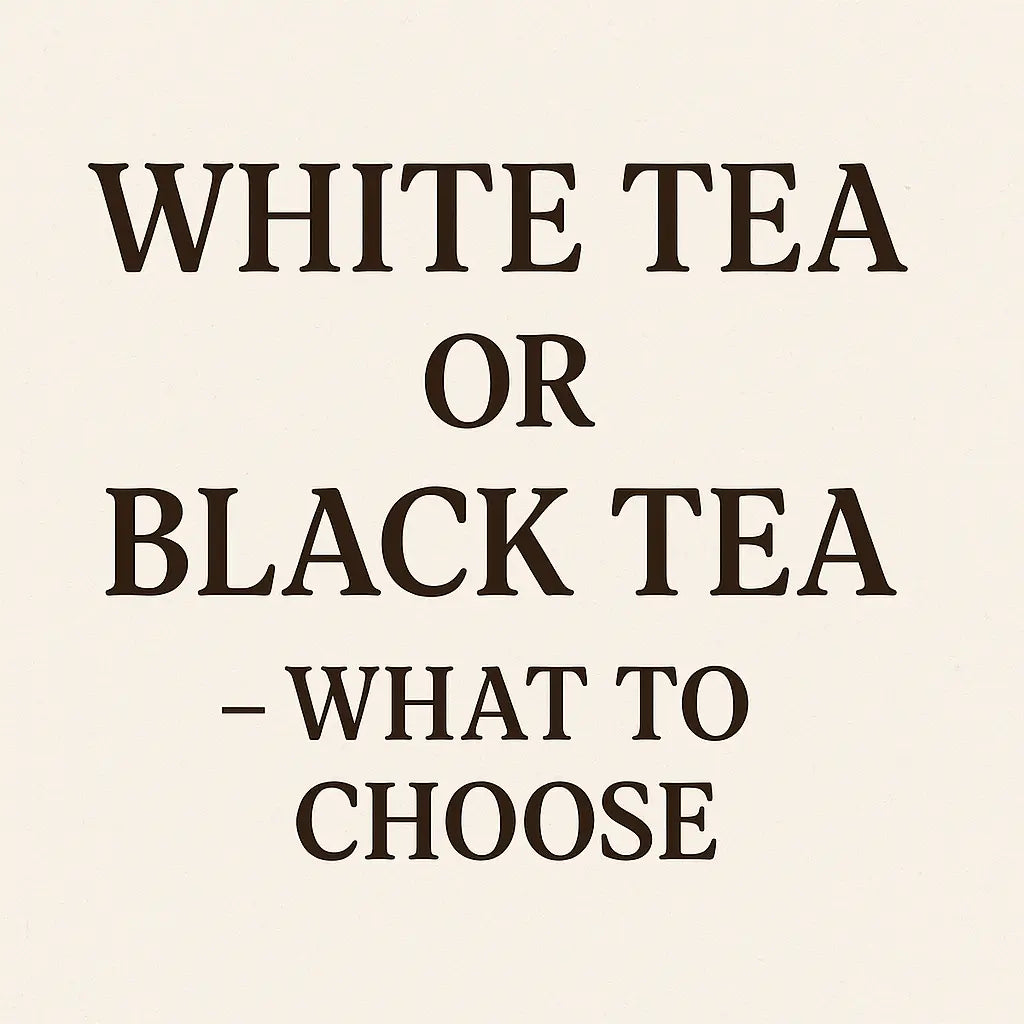Tea lovers, are you curious about the world beyond your regular brew? You’ve likely heard of black tea and white tea, but what truly sets them apart? While both are derived from the same plant, Camellia sinensis, they are worlds apart in taste, processing, benefits, and even how they engage your senses.
We’ll take a deep-dive into the contrasts between these two tea types, uncovering everything you need to know to make your next cup truly intentional. Whether you’re looking to refine your palate or simply expand your tea collection, this guide is for you.
The Camellia Sinensis Connection
Both black and white teas come from the Camellia sinensis plant. What differentiates them lies in their level of oxidation, a chemical process triggered when the tea leaves encounter oxygen after harvest.
- White Tea undergoes the least processing, with minimal to no oxidation. The delicate buds and leaves are hand-plucked, withered naturally in sunlight, and gently dried to preserve their subtle flavor.
- Black Tea, in contrast, is fully oxidized. The leaves are withered, rolled, oxidized for a set period, and then dried. This results in their robust flavor and characteristic deep hue.
Think of oxidation as the “cooking” process of tea leaves. White tea is lightly kissed by heat, whereas black tea is fully transformed, bold and intense.
What Makes White Tea Special?

White tea is known as the most delicate and least processed of all tea varieties. Originating in China’s Fujian Province, this tea takes minimalism to an art form.
Processing
White tea production is simple; it involves plucking young buds (often covered in fine silvery hairs) and minimal drying with little to no rolling or oxidation. This careful process locks in antioxidants while maintaining their natural purity.
Flavor Profile
Expect a refreshing, clean, and silky taste with subtle floral and fruity notes. White teas like Silver Needle and White Peony deliver a lightly sweet tone with no bitterness. When brewed, they offer a pale yellow to light amber hue.
Caffeine Content
White tea is celebrated for its lower caffeine levels (15-30 mg per 8 oz cup), making it a great choice for those who prefer gentler stimulation or a mid-afternoon unwind.
Health Benefits
Packed with antioxidants, particularly catechins, white tea is your companion in fighting free radicals. It promotes glowing skin, aids in stress relief, and offers potential weight management benefits.
Brewing Tip
Use water heated to approximately 160-185°F and steep for 3-5 minutes. White tea requires gentle treatment to draw out its subtle complexity.
The Bold World of Black Tea

Black tea dominates global tea consumption, accounting for 68% of the total. Known for its full-bodied flavor and robust aroma, black tea is the powerhouse of energy and depth.
Processing
Black tea undergoes rigorous processing. The leaves are rolled, fully oxidized, and then dried, giving them their distinctive dark hue and bold flavor profile. Depending on how the leaves are prepared, black tea can be crafted via orthodox methods (whole leaves) or CTC (Crush, Tear, Curl) techniques, creating granules commonly used in tea bags.
Flavor Profile
Black tea offers a wide range of flavors, from malty and sweet (Assam) to floral and muscatel (Darjeeling). Its deep reddish-brown liquor is satisfying and invigorating, pairing well with milk or lemon.
Caffeine Content
With 47-90 mg of caffeine per 8 oz cup, black tea is perfect for kick-starting your day with a boost in energy and focus. The combination of caffeine and L-theanine promotes "calm alertness," making it a unique alternative to coffee.
Health Benefits
Black tea is rich in antioxidant compounds like theaflavins and thearubigins, which can support cardiovascular health and enhance gut health. Add its cognitive benefits, and you have a brew that stimulates both body and mind.
Brewing Tip
Use water heated to approximately 190-210°F and steep for 3-5 minutes. For an extra robust flavor, experiment with longer steeping times or additional leaves.
Comparing White Tea and Black Tea - at a Glance
|
Feature |
White Tea |
Black Tea |
|---|---|---|
|
Oxidation |
Minimal (0-5%) |
Full (100%) |
|
Processing |
Simplistic, hand-plucked |
Rigorous rolling & oxidation |
|
Flavor |
Delicate, floral, smooth |
Bold, malty, rich |
|
Caffeine |
15-30 mg |
47-90 mg |
|
Appearance |
Pale yellow/light amber |
Deep amber/reddish-brown |
|
Health Benefits |
Higher antioxidants, gentle |
Cardiovascular & cognitive benefits |
|
Pairings |
Best enjoyed pure |
Pairs well with milk/lemon |
Both teas have unique qualities, opening the door to captivating tea-drinking experiences based on your preferences.
Black Tea or White Tea - Which One Should You Choose?
- Choose White Tea If You Enjoy
A subtle, elegant tea with soft flavors and lower caffeine levels. Perfect for winding down or when you crave something light and refreshing.
- Choose Black Tea If You Enjoy
A bold, punchy tea with rich, deep flavors. Ideal for morning energy boosts or pairing with a hearty breakfast.
Why not add both to your routine? Mornings with black tea and evenings with white tea can offer the best of both worlds.
Take Your Tea Journey to the Next Level
At [Brand Name], we’re passionate about giving you access to the finest hand-curated teas from around the globe. Whether you’re a fan of the understated elegance of white tea or the bold energy of black tea, we’ve got something for you.
Start exploring your next favorite brew today.




